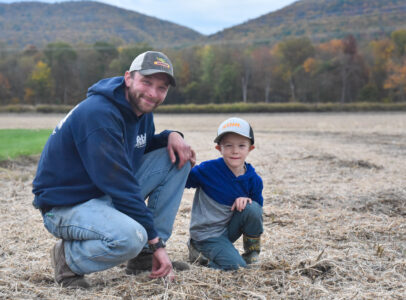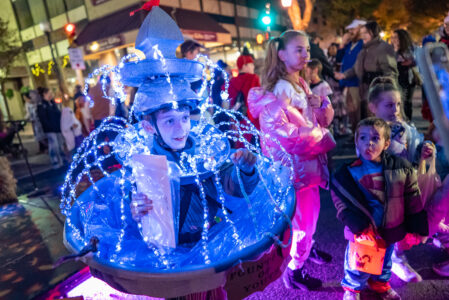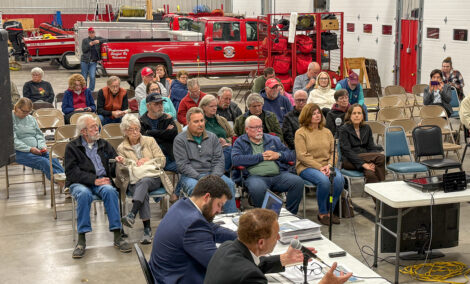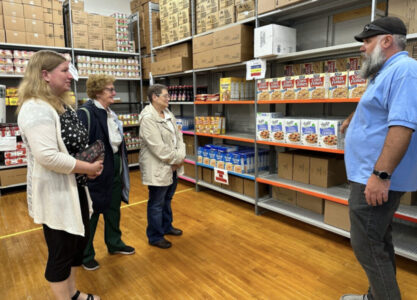Person of the Year finalist: Alina Beskrovna: Shining a light on Ukraine’s suffering
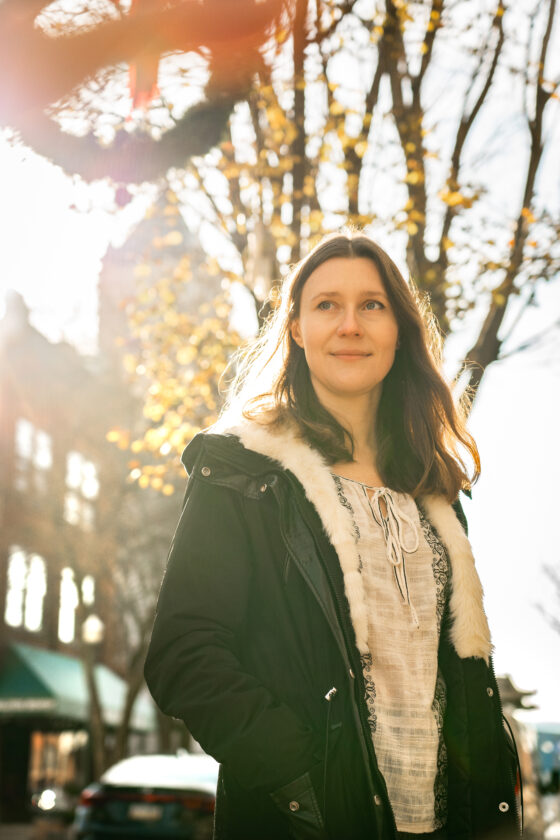
DAVE KENNEDY/Sun-Gazette Williamsport Area High School graduate Alina Beskrovna escaped from the war in Ukraine earlier this year. She is seen here in downtown Williamsport recently. She left her town of Mariupol, and she and her parents now live in Williamsport.
A Ukrainian woman who graduated from Williamsport Area High School is back and staying with her host family in Lycoming County after she and her parents escaped from their homeland invaded by Russia earlier this year.
Alina Beskrovna, 32, is a proud woman from Mariupol, Ukraine, a city that was leveled by shelling and bombings.
In being forced to leave her country with her mother and cats, they endured hardship living in a basement crowded with others surviving amidst shelling and surrounded by the Russian army.
She recently reunited with her 66-year-old father who also escaped — shell shocked and thinner, but alive.
The three are staying with Geoffrey and Robin Knauth of Williamsport.
Alina’s story begins when she was 16, and she came to America and stayed with a host family, the Knauths.
Upon graduating and returning to the Ukraine, going to school in Kiev, its capital, studying applied mathematics and also returning to the U.S. to attend Lehigh University to earn a master’s of business administration, the world was her oyster.
Educated, and enjoying her life in the cosmopolitan and metropolitan city of Mariupol, a coastal city on the Sea of Azov, she was like any other young professional, working and spending time with friends at night, and living with her mom and cat in a modern apartment.
That all came to a sudden end in February, as the Russian Army began a multi-pronged invasion, which it called a military operation, but which Ukranians, and most of the freedom-loving world, saw as war. Knauth, a Harvard University graduate who speaks fluent Russian, said he knew based on the moves that Russian troops made in Russia and Belarus that the invasion was imminent.
As the year ends, Beskrovna continues to advocate for her homeland, educating Americans about the tragic consequences brought about by the Russian invasion and warning them that they must do all they can to continue to support those left in the dark without electricity and heat in winter.
“Russia brought in mobile crematoriums,” she said, not shy about what she frequently described as “invaders” and Russian President Vladimir Putin’s imperialistic mindset.
Her testimonials of survival and determination, for seeing justice done and her support for those left behind to fight back, is the stuff of novels.
While Beskrovna was able to escape the bombs ordered by Russia’s leader on her people, her harrowing story of how she lived in a basement in Mariupol is enough to send chills up one’s spine.
Beskrovna said it was more important now to educate those in Williamsport and elsewhere how Russia also targets journalists, especially foreign journalists who were enemy No. 1 because of their unedited stories on the ground and real-time images unable to be whitewashed by the Russian media.
For example, Russia routinely has pushed a false narrative that a theater housing people in Azov was blown up from the inside.
Again, the shelling of a maternity ward was supposedly hit by friendly fire, according to the Russians.
Before she fled, Beskrovna helped journalists on the ground get the accurate stories out. They include various independent journalists and those working for National Public Radio and publications such as the Philadelphia Inquirer, Wall Street Journal and Al Jazeera.
Because the Russians army cared less about women and more about men, Alina looked like a local gal with several cats, she said, so she went unnoticed.
What Beskrovna was actually doing was recording, making notes and memorizing the various checkpoints.
“I’ve smuggled out the pieces of missiles fired at our building,” she said.
The hope is that the markings on the factory can lead back to where it was produced in what year in Russia.
Asked if there was anything she would have done differently, Beskrovna said “you can’t change the past,” but then added: “Had I known the war was coming I would have started smuggling, you know, the elderly,” she said.
This Thanksgiving, she said, “I’m thankful to be alive.”
On the Facebook site, she was seen sitting around a table.
She buried her Ukrainian flag in a jar, dug a hole and put it underground in front of the kitchen window by some bushes hoping that if she ever returns that she can retrieve it.
She equated this to if Americans had to dispose of anything representing America, such as the Stars and Stripes, which would be disposed of.
“You pretend you are happy to see the invaders,” she said.
A father left behind,
whereabouts unknown,
condition unclear
“I was already out of danger,” Beskrovna said in a second interview with the Sun-Gazette after she had returned to Williamsport. “OK, I was already out of the occupied zone, but my father stayed behind.”
The fear of her father’s safety and whereabouts was real, especially with today’s technological advances.
“It is very easy to Google me,” she said. “It’s very easy to pinpoint where he lives because they specify the details and I mentioned him in every interview,” she said.
Pictures of her father were widely distributed among those with whom she had interviews.
The time between Beskrovna and her mother’s escape from Ukraine and the time that her father was located was close to two months.
“So that was two months of my wondering,” she said, adding her greatest fear was potentially ending his life with each interview.
But how did Beskrovna locate her dad?
Through a messenger service called Telegram, but even that was suspect.
It might be the Russian intelligence services, she said, or it might be enthusiasts on the ground who were legitimately trying to help people.
It could be used by those who collect databases of individuals who remained versus those seeking another home.
The Telegram channel is linked to the suburbs of Mariupol. She used it. She posted his bio.
“People I had never met contacted me,” she said, adding some told her that they had stayed in the same basement shelter with him.
It gave her tremendous hope.
Those who spoke had also escaped to Russia many weeks before and had not had any contact since.
Then, a woman posted that she lived across the street from him.
Getting in touch was troubling.
“You had to find a new SIM card,” she said, describing that tracking card in the cell phone.
The cards were provided by Oculus, but this was occupied by the “invaders,” as she called Russians.
None of the Ukrainian SIM cards worked.
“You had to stand in line for days,” she said.
Electricity was out, so charging phones was impossible.
But as luck would have it, this woman said she had a SIM card and it was how she was in contact. She also had a car with enough fuel, which was how she also charged her phone.
Nonchalantly, the woman said, “So, tomorrow I will walk over to his place to catch up on him and have him contact you.”
Her father contacted her. He and several families and cats were smuggled to the Russian border.
Much like the Underground Railroad for Black slaves, those seeking to escape were instructed on what to say at the border.
“You never say you are going into Europe,” she said. Nor does one tell border guards their intention is to flee the invasion.
Instead, it is best to say “I’m looking for work because I lost my job,” she said.
It’s best to say because of the situation “I’m heading to Moscow to work,” she said.
That is how those fleeing Ukraine are permitted into Russia.
Her 66-year-old father, meanwhile, could not say he was looking for work. He was retired and had nothing to do with the Ukrainian army.
“They did not particularly care about him,” she said.
Either he was so unimportant or they were stupid, but they let him through, she added.
He spent two days traveling and eventually entered Latvia and Estonia.
“I picked him up in Warsaw,” she said.
The reunion was surreal.
“It was more surreal for him than it was for me because once I found out he was alive and found out he was in Russia, I knew everything would be fine,” she said.
For those 60 days her biggest fear was he was dead or detained and in prison. For after the infiltration, hundreds of civilians were killed.
When she saw her father his appearance was shocking. He looked much older, thinner, and the extra large size clothing he wore no longer fit, she said.
He had lost about 24 pounds.
He acted normal, made fun of things, as a coping mechanism.
But then he would recount burying bodies, picking up pieces of body parts and placing them in trash bags to bury.
He casually mentioned how his down jacket needed to be fixed, adding that his wife could do it, before saying, “Oh, a sniper almost got me.”
He laughed, but it was hard to comprehend.
And not many “care,” she said, sadly.
Once they made it to Denmark, they thought about going to Canada. If her parents were by themselves, they might have stayed in Europe because of the better social assistance.
But Canada and the United States do not have a “proper refugee program.”
“We’re not refugees,” she said.
Canada, however, does provide an open work permit immediately. “As soon as you land,” she said. “They give you a multiple entry Visa for three years for free in your attempts to obtain permanent residency,” she said.
Find a job, and “you’re welcome to stay.”
Her parents had the interview in Montreal and were given green cards. Her mom was given a green card through a diversity lottery and her father was given one as her married dependent. Beskrovna, because she is over 21, was not part of the family.
“I’m here on a two-year humanitarian parole,” she said.
Her host family, the Knauths, who were her host family when she attended high school and Lehigh University, provide her and her parents a place to stay.
“They said, ‘Come and stay as long as you need to get back on your feet,'” she said.
It is a connection Beskrovna and the Knauths have had since she was 16.
Challenges at home, but far less arduous or frightening
Can her goal of citizenship change over the next two years?
To do that, she would have to either find an employer who would be willing to sponsor her for a green card, go back to school or get married.
Does she see that path or is it too early to make that decision?
“I applied to a couple of schools,” she said, however, she does not want to be a “perpetual student.”
After the war is won, she said, with optimistic fervor, that would be the first stage.
“That is not the most defining stage,” she said.
“I feel like the way we rebuild will define the future for generations to come,” she said.
Toward that end, she is concerned that the international development professionals that will flood the country after the victory will not have enough understanding of the needs on the ground or the particulars of the mentalities of the Ukrainians who have stayed or returned.
Beskrovna is educated. She has a strong mathematics background, having earned a master’s degree in applied math and Master of Business Administration in finance from Lehigh University.
She also worked in development in Mariupol and is exploring thoughts of going into public policy or international development to ensure that all of the international resources will be spent in the right way after the victory.
Currently, her focus is to find an employer, probably the company that would be willing to sponsor her for a green card so she can remain in the U.S.
Is that an expensive undertaking?
For a large corporation, the cost is nothing.
“A lot of them don’t want to deal with it because they can hire someone local and not have to bother,” she said.
From here in Lycoming County, the three can see their home city in eastern Ukraine being dismantled.
“We see it live,” she said. “We see the school my mom went to as a kid . . . and the factory my dad worked at,” she said. “On satellite maps, the city districts are gone. People we knew are missing and killed in action. It is very hard to bear.
“You know, like you look outside and it’s absolutely normal and Christmas music is on the radio, just like nothing is happening and then you check the news and it’s another wave of bombings,” she said. “It desensitizes you and you don’t feel the horror any more, but you are just numb — like, numb to life.”
What does Beskrovna believe are aspects of Ukraine’s situation that Americans should pay more attention to?
Depending on their political views, she said, many Americans either completely misinterpret or downplay what is going on.
Some think that Ukraine brought this on themselves, and should not have poked the bear, she said.
Others genuinely do not care and want it to be over, but there is a warning: “You can’t appease a person who wants to imperialistically expand his empire,” she said of Putin and those of his ilk.
Russians are imperialists, she said.
Their thinking is that Ukraine is a non-state. A failed state. A fake state.
They believe it is a made up concept and it should be dismantled. They also think it is a historical mistake. The Russians view Ukraine as a danger to their existence, which is somewhat true because “we show how it can be.”
In 2014, a mass movement took place to overthrow the president that was appointed by the Kremlin. He was a yes man and not working for the people. The war was a horrible example for the Russians to see.
“They had to make sure there was a narrative that if you revolt, you will trigger devastation,” she said.
It remains negligible about the percentage of people who truly understand what is happening.
A certain percentage of Americans do not believe in sending arms to Ukraine, or aid there and they hope the situation resolves itself and all returns to normal.
“That shows me no one has learned anything from the 20th century because that will be only the beginning of the third world war,” she said.
Right now, Ukrainians are valiantly fighting for this empire to not go further.
“We took the first blow,” she said. “We’re protecting Europe.”
Poland, for example, understands that, because of their exposure. “They’ve been there,” she said, of the border nation.
What can ordinary Americans do?
“One is to donate to an organization called Razom for Ukraine,” Beskrovna said.
That is tax-deductible and works directly with the frontlines supplying items such as generators and bulletproof vests.
It helps civilians to survive, too.
Secondly, U.S. citizens can sponsor someone from Ukraine.
A program called United for Ukraine is an option.
Facebook groups also may be able to reach individuals who seek sponsorship or families.
Thirdly, vote, she said.
Check political agendas of candidates. Know whether they have voted to supply Ukraine or not.
The greatest danger is to live through another world war.
Please remember, Russian is not a state sponsor of terrorism but is rather a terroristic state, she said.
Their goal — to murder as many students as possible this winter, to push the government into negotiations. The reason? Because Russia is losing on the battlefield.
For those on the ground, it means living without electricity, heat, hot water, which is pushed through electric pumps. Russia has targeted the electric grid and has taken out about 70% of it. It means blankets are survival tools. It means living under blackout conditions in the worst of winter.
“If you do not live on the frontline, it feels as though you live on it,” she said.
Power banks, generators, diesel generators are needed for surgeries, which are stopped in mid-process and have to be performed under LED lights.
Children who need inhalers are gasping for air.
“I think Russia thinks that eventually, people will turn against their own government because of the discomfort they are feeling,” she said.
But no one in Ukraine is stupid.
“You can talk to a 90-year-old babushka who grows potatoes in a remote village and she might not have the terminology but she knows what is going on and why,” she said.
“She has seen the Russian soldiers and she has been afraid of speaking Ukrainian for fear of being labeled a Nazi,” she said.
“You do not need a crazy, undercover informational campaign to educate the population,” Beskrovna said.
Most of the population is aware of what’s happening. The feeling of resilience and powering through is there and the people are really angry.
A whole generation of younger Ukranians are growing up in war time.
And the invaders are coming from occupied territories and Russia. Some arrived from Crimea and depending on the direction they wanted to go, would steal cars, making the owners walk back under shelling, having to buy food scraps miles easy and then the cars would be painted with the letter V or Z.
They are a mixture of ages, some in their 20s, while others are in their 50s, she said.
Most were contract signers and paid at the time, and were not yet those mobilized as of late. Some at the checkstations were mercenaries.
The only hope is to defeat Russia, she said, adding how there is no end to this war if that does not happen.
Whether it is the collapse of the county and separate entities forming as they did for Germany after World War I with reparations, is unknown.
Next, Ukraine will need to have its territories returned — especially those that have been chipped off.
Wholescale devastation has taken place. Industries and towns have been turned into rubble. Regions the size of Pennsylvania are wiped out.
The latest technology and enough funding will have to be deployed.
“I am hoping that Ukraine will emerge greener, with less reliance on the post-Soviet inheritance that we had in the 1990s,” she said. Enough international investors will be needed to rebuild the nation.
But there is no point in rebuilding if it can all be crushed again, she said.


